| Columns Retired Columns & Blogs |
I apologize in advance if I missed his mention, did Joe Morello make the list?
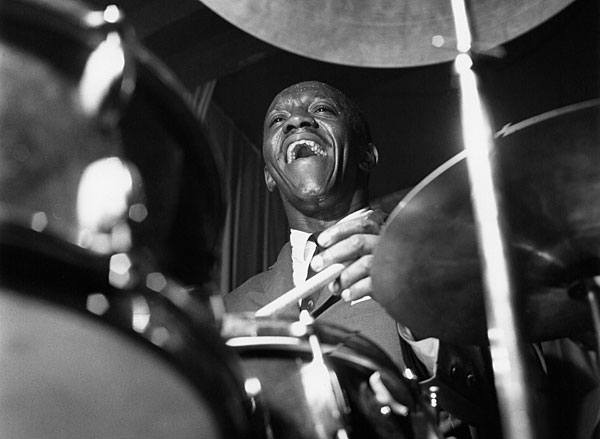
Celebrated New York City–based jazz drummer Billy Drummond recalls his first visit, with the group OTB ("Out of The Blue"), to the Mount Fuji Jazz Festival in Yamanashi Prefecture, Japan. It was 1988. The Festival's elite drummers ranged in age from 69 (Art Blakey) to 26 (Ralph Peterson). In between were Roy Haynes, Tony Williams, Clifford Barbaro, Victor Lewis, Lewis Nash, Kenny Washington, Cindy Blackman—"and me," Drummond told me, by phone.
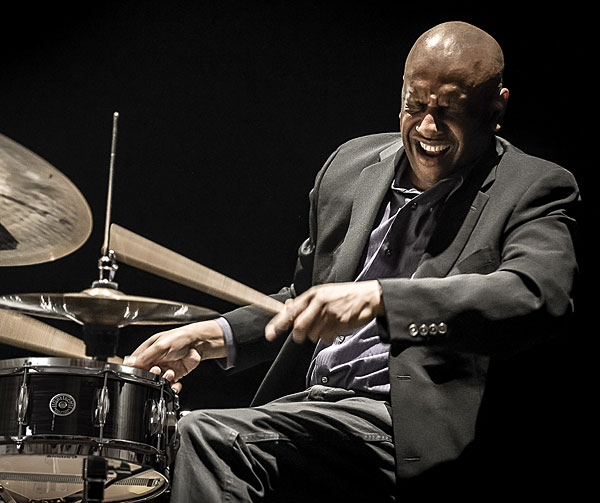
Drummond, who is working on his fourth album as leader and teaches drumming at Julliard and NYU, continued. "Everyone was killing, then Roy Haynes played, and he's taking it out. He walked to the front of the stage and played an entire solo on the hi-hat. The people went berserk. We're going nuts. Afterwards, Haynes comes off the stage and says to us, 'Take that you young m***** ******s!' We fell out, because he just served us, man. Remarkable."
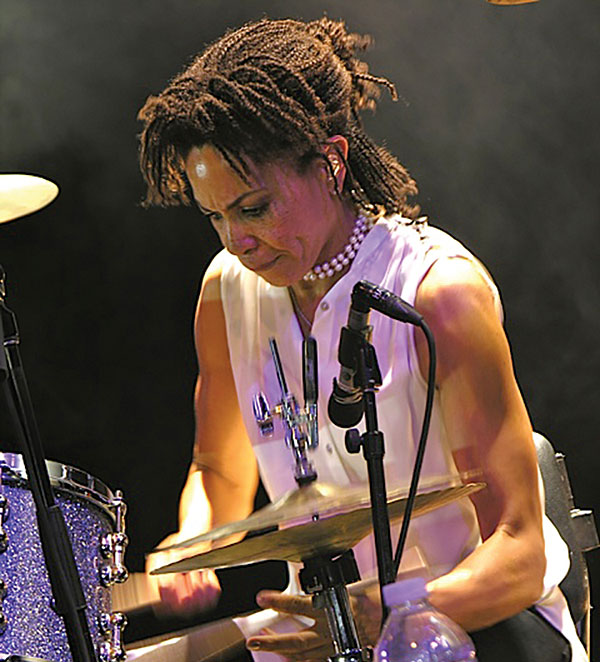
Art Blakey. Roy Haynes. Tony Williams—three of the greatest jazz drummers ever. Blackman, Nash, Peterson (footnote 1), Washington, Drummond: Five of the best young jazz drummers of the era.
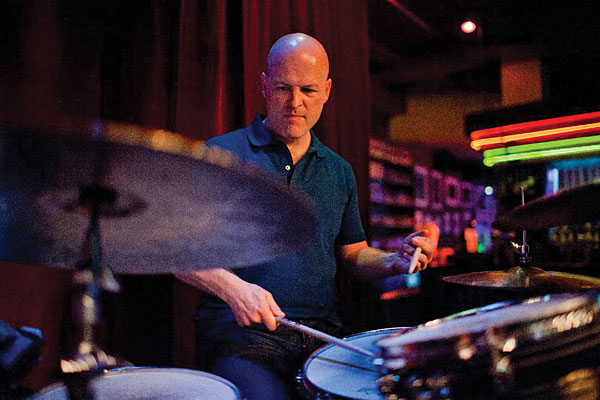
I interviewed Drummond—who played on the Stereophile album Rendezvous—for this article, seeking his commentary on the best drummers in the history of jazz: what made them special, what to listen for in their music. I also talked to Paul Wells, the drummer for Vince Giordano's Nighthawks, who play mainly jazz from the '20s and '30s. Wells's repertoire is much wider than that, though: He has also worked with the Vanguard Jazz Orchestra, the Jazz at Lincoln Center Orchestra, Wynton Marsalis, and Elvis Costello, among others. You can hear him on the soundtracks of The Irishman, Boardwalk Empire, and The Marvelous Mrs. Maisel. He's a Professor of Jazz Drums at the Juilliard School and an audiophile.
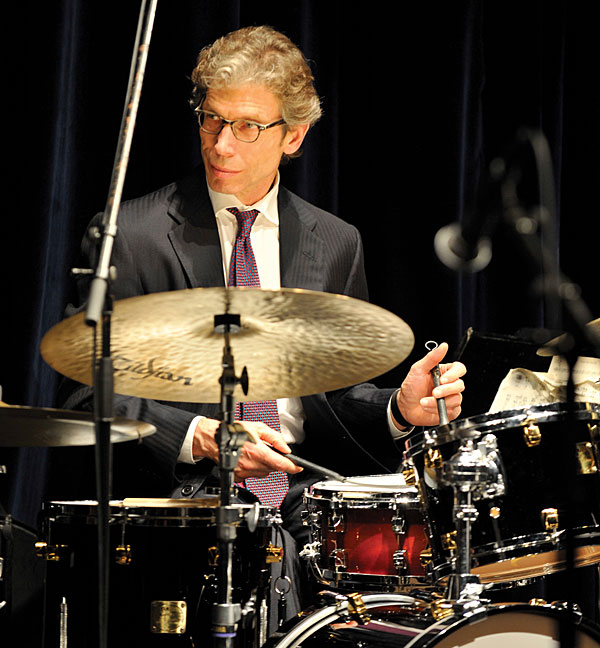
I also talked to John Riley, the drummer who replaced the legendary Mel Lewis in the Village Vanguard Orchestra (formerly the Thad Jones/Mel Lewis Orchestra) after the latter passed in 1990. Riley has recorded dozens of albums and written a book, The Art of Bop Drumming. He is a Professor of Music at Manhattan School of Music and at Kutztown University in Pennsylvania.
Much of the commentary that follows is from Drummond, Wells, and Riley. Uncredited commentary is from me.
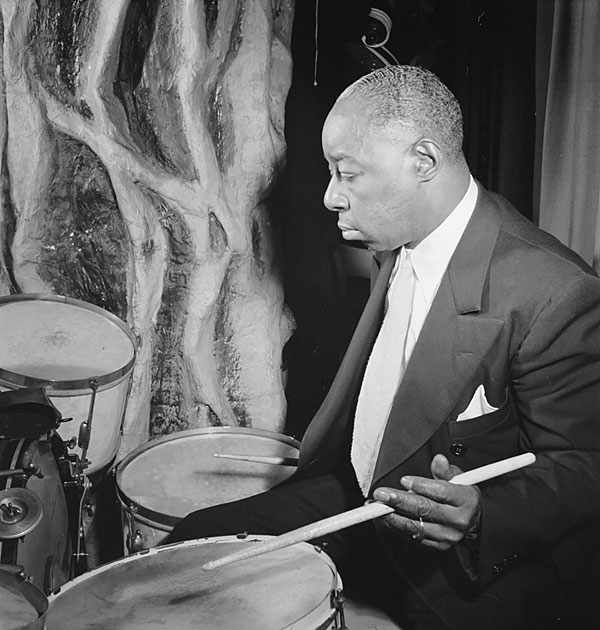
A concise jazz history
Jazz drumming can be traced to the drum circles of Congo Square, in New Orleans, which birthed the "hot jazz" styles of the 1910s and '20s, later called "trad jazz" or "Dixieland." The most prominent jazz groups of the era include Jelly Roll Morton's Red Hot Peppers, Louis Armstrong's Hot Fives and Sevens, and Johnny Dodds's Black Bottom Stompers. The New Orleans drummers in these bands—"Baby" Dodds, Zutty Singleton, etc.—laid the foundation for contemporary jazz drumming.
Even before Dixieland launched jazz as an art form—before the first "jass" recording—James Lent recorded a drum solo, "The Ragtime Drummer," in 1912, a swinging workout of brash rudimental rolls, playful temple blocks, and zippy brass, climaxing in a forceful snare drum solo. The first jazz drum solo preceded jazz.
Dixieland's popularity led to the swing craze of the late '30s and '40s, when the music was at its most popular, when drummers Gene Krupa and Buddy Rich and bandleaders including Benny Goodman and Artie Shaw—not to mention Duke Ellington and Count Basie—became international celebrities.
After World War II, bebop—a movement led by Charlie Parker and Dizzy Gillespie—brought the music "out of the dance hall and into the concert hall," as Riley put it. No longer required to merely keep time, bebop liberated drummers to become active and engaged musicians, emancipating the drum set to color and drive the arrangements and lift and inspire the frontline soloists.
Groove returned in the hard bop of the '50s and '60s, which expanded further to embrace rock rhythms in early '70s fusion. Jazz reached its zenith (some say its nadir) in free jazz under the aegis of Albert Ayler, Pharoah Sanders, Alice Coltrane, latter-period John Coltrane, and others, the movement's drummers reflecting the music's openness, energy, and rejection of conventional forms.
The Drummers: 1920s–1950s
"All of these drummers had a certain energy in the way they hit the drums and how they played accents—a certain pop and tightness combined with a way of phrasing eighth notes," Wells told me. "It's a consistent sound, the feeling and energy of Black American music, and it's present throughout the history of this music."
1920s–'30s
Warren "Baby" Dodds had a long career and played with King Oliver, Louis Armstrong, and Sidney Bechet. It's hard to hear the drums on some historic recordings, but Dodds's drums are clear enough on Footnotes to Jazz, Vol. 1: Talking and Drum Solos. Dodds was well known for his "shimmy beat," which he described in his autobiography: "One night a French soldier came in. When he heard the music, he couldn't dance to it, but he just started to shake all over. That's the way it affected me. I saw him do it, and I did it, too."—Wells
Zutty Singleton played a lot of press rolls, a lot of colors. He might play snare drum time for the first chorus, then accents on the tom-toms and little cymbal hits. Zutty's on Louis Armstrong's Hot Five recordings, including "West End Blues," where he plays "pop" cymbals, a precursor to the hi-hat.—Wells
Paul Barbarin: Drumming style was changing, early jazz melding into swing; timekeeping moved from the snare drum to the hi-hat. Barbarin did both, depending on the era. In the '30s, Barbarin played with the Louis Armstrong Orchestra on a ton of great recordings. "Cuban Pete," with Armstrong, has Barbarin playing in a swing style, playing time on the hi-hats.—Wells
Chick Webb was the first drumming star. Webb led his Harlem big band in 1931 and made a transition from an earlier style to a more modern swing style. He was an explosive, energetic soloist and a really great time player. "Harlem Congo" is one of his great tracks.—Wells
1940s
Gene Krupa was a swing-era superstar, perhaps most famous for Benny Goodman's "Sing, Sing, Sing." On Goodman's "Sometimes I'm Happy," Krupa plays brushes in traditional style, moves to the cymbal for the trumpet solo, press-rolls on the snare drum, then keeps time on the hi-hat during the brass shout.—Wells
"Papa" Jo Jones's style of playing time on the hi-hat was revolutionary. It felt great, especially with bassist Walter Page in Count Basie's band. He was one of the first drummers to play time on the ride cymbal.—Wells
"Big" Sid Catlett was an amazing timekeeper, a great soloist, and a brilliant technician with amazing drum sound. Satchmo at Symphony Hall has a couple of long drum solos that let you hear the tonality of Sid's drums. Sid is also great on Charlie Parker and Dizzy Gillespie's Live at Town Hall.—Wells
Buddy Rich was an amazing soloist, with technique that remains unmatched. He's on the Ella and Louis record and in that amazing video with Charlie Parker and Dizzy Gillespie, Celebrity (& Buddy Rich). [Live 1950]. Buddy's Swingin' New Big Band and Big Swing Face albums from the '60s show his modern style.—Wells
Other important drummers of the swing era: Cozy Cole, Sonny Greer, Dave Tough, George Wettling, and Shadow Wilson.
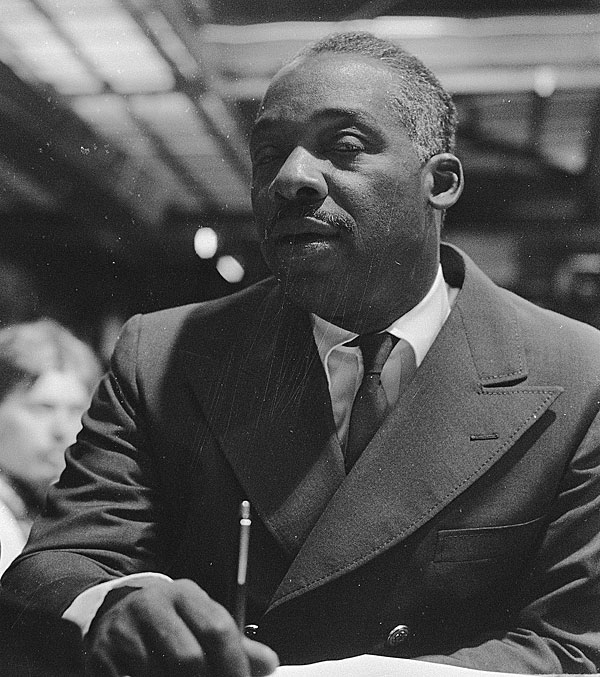
1950s and '60s landmark drummers
Kenny Clarke was an extraordinarily innovative pioneer of bebop styles and one of the most in-demand drummers for record and jazz dates until '56, when he moved to Paris and never came back. He was practically the house drummer for Savoy Records.—Wells
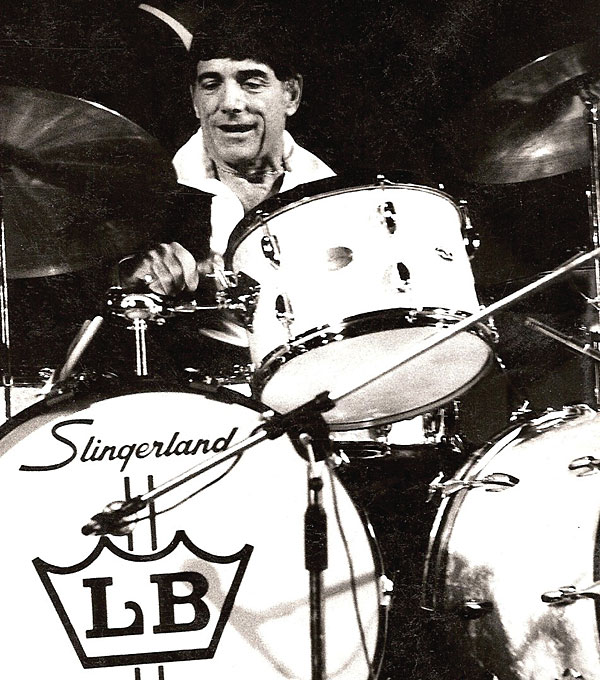
Louie Bellson pioneered double bass drums. He made many records as a sideman, particularly on Verve and Pablo. Bellson was in Ellington's band in the early '50s, which is significant because it was unusual for a white drummer to join a major Black band during that period.—Wells
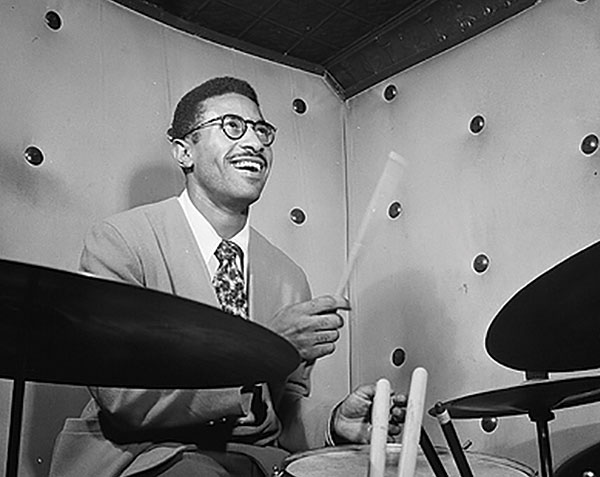
Max Roach developed a jazz language between the individual drums, an accompaniment language, and a soloing language still used today. An entire vocabulary of patterns, ideas, and melodic figures came out of Max's genius. He defined the bebop drum sound using smaller tom-toms tuned very high that were clean and articulate.—Wells
Han Bennink is a deep bopper. Amazing facility on the instrument. Even now, he practices a couple of hours every day. He is of the generation of European musicians that grew up with bebop but then decided they wanted to find their own way to play improvised music. And that's where the more adventurous side came out.—Riley
Art Blakey learned his craft from Chick Webb, for whom he worked as a valet. He began his career with Billy Eckstine's big band, eventually leading the Jazz Messengers on many Blue Note classics. Blakey's fiery style, marked by blazing buzz rolls, stop-time cymbal crashes, and a gritty, hard swinging-time feel, is as popular today as at any time in history.

Saying Morello "had little impact on jazz drumming as a whole" is as clueless as it is naive.
Joe was a master technician. Buddy Rich recognized Morello's technique as equal to his own.
As an innovator, he was fluently comping and soloing in 5/4 when the majority were struggling just to not get lost in it. I think that was the "big splash" you referred to with Brubeck.
There isn't a drummer on the list who doesn't admire Joe Morello.
Milford Graves?? Get real.

Bernie is a studio powerhouse, and only recently did I realize how often he was the drummer on cuts where I'd loved the drumming. He's got three albums out under his own big band name. All of them released not just as CDs, but in Blu-Ray 5.1 and 9.1 surround. The 5.1 surround made me feel like I was back in the big band I toured the midwest with 45 years ago. I took the live Blu-Ray to an audio store to hear it in 9.1, and everyone who came into that place stayed in the room listening to his band, and, his drumming, which is front and center. All of the band are studio stars, all are amazing. But his lead trombone... WOW. But, back to drummers...
Bernie is a phenomenally complex drummer. In his career, he's been great at playing to match his clients' sound and style. Hearing him in his own band is like hearing him freed. I'm a huge fan of several current jazz drummers, a few of whom are personal friends. They turned me on to Bernie.

I saw him several times with the Mahavishnu Orchestra, including on the tour with Carlos Santana. I think he played more beats per second than any drummer I've ever heard. And a couple times in every concert, someone would come from backstage with a bucket of ice cubes and water, and pour it over him. Unbelievably, his speed would triple, he'd grin at the sky (and we'd all feel cold), and then steam would rise from him for the next half hour... until his next ice bath.

Papa Jo was just amazing. IIRC, Buddy Rich mentioned him as an influence. I think they also missed Dennis Chambers. I met him briefly when taking jazz lessons in Baltimore. Nice guy and incredible drummer.

I'm sitting here listening to Daniel Barenboim playing his new Piano and reading about Drums and drummers wondering what site I drifted into ??
What, this is Stereophile and it's Mr.KM teaching the history of Jazz, hmm.
It could only be you or the wonderful Jazz Shepherd, who else thinks about this ?
You widen the scope of focus for Stereophile and we readership, I always feel like I'm learning something after reading your writings. Thank You!
Tony in Florida

has his area of expertise, I have mine. Thanks as always Tony

...enjoyed Bob Moses with the early Gary Burton Quartet with Steve Swallow and Larry Coryell. Then one night Bob was ill and Roy Haynes sat in and my mind was blown.
Also I want to give a shout out to Thurman Barker, a personal favorite.

Whenever I read a poll from Rolling Stone about the best drummer or guitar player, I'm tempted to write them and mention any number of drummers mentioned in this article. The same applies to guitarists.
While there are some pretty good rock drummers IMO most can't hold a candle to the drummers mentioned. That includes Geddy Lee. His most published accolades all seem to revolve around the number of drums in his kit. Who cares how many drums are in your kit?
I feel the same about their best guitarist polls. Think of John McLoughlan and Al Dimeola for starters.
If Rolling Stone would say best rock drummer or best rock guitarist I would be on board. However, saying "best" while restricted to rock musicians means nothing in the big picture of all music.

Geddy Lee is a bassist. I am not a Peart (or rock drummers in general) apologist but if you do not think Neil could hold a candle to some of the best jazz drummers, you really don't know anything about him (including his name).
Case in point, Peart performing at a Buddy Rich tribute (notice the size - or lack thereof - of his drumkit): https://www.youtube.com/watch?v=EDJRoN9Yoas

Peart was a prog rock drummer.

Nice to read the input from the drummers. There is one thing in the list of drummers of the future - instead of Jason Faulkner, did you mean Justin Faulkner ?
I've seen him perform as part of the Branford Marsalis Quartet, and he is very very good. Excellent really.

No problem, that happens to the best of us. You should see what I do with restaurant menus. ;>)

There is one thing in the list of drummers of the future - instead of Jason Faulkner, did you mean Justin Faulkner?
Corrected.
John Atkinson
Technical Editor, Stereophile

Outstanding! article- KM.
Keep up the strong work.


Well done, great overview and commentary.
Was a bit alarmed when you seemed to quickly jump from New Orleans to Swing but glad to see you gave props to the Chicago scene by mentioning Dave Tough and George Wettling as well as including them among the selected recordings.
Most startling oversight was not including any recordings of Papa Jo Jones. Paul Wells acknowledged his importance in the evolution of drumming styles; Jones was the driving force behind the greatest swing era rhythm section. Even if you wanted to avoid his 78 era recordings with Count Basie along w/bassist Walter Page and guitarist Freddie Green, there's plenty of wonderful Verve sessions featuring Papa Jo's artistry. Or the John Hammond produced Vanguard sessions led by Jones. [edit: Oops, never mind, my bad - wasn't expecting to find him represented in the "70's" but better late than never...]
And if you're talking about drumming in jazz, I'd say Chano Pozo deserves a mention - but yeah that's straying beyond the drum kit.

I thought we'd included Papa Jo Jones' master class, "The Drums," but it appears to have been mistakenly deleted.
Our timeline was based on history and recordings.
Chano Pozo was a percussionist, not a trap set drummer.

Hey Ken - sorry, realized my mistake after posting comment and immediately edited to note my oversight -- wasn't expecting Papa Jo to show up among "the 70's" recordings! But of course, his wonderful The Drums album was the obvious choice.
And I'd never heard of the James Lent recording before, thank you very much. Not quite sure I'd describe it as "jass" - predominantly martial rhythm to my ears -- but certainly a fascinating recording of nascent jazz drumming nonetheless.
So, how about a follow-up history on the role of the bass in jazz? (Actually, would probably need to start with a tuba...)
Cheers!

While I don't pay much attention to rock or the musicians, 9-year-old Yokoko did impress me. I wonder what she'll be doing in 10 years.
https://youtu.be/8ip47GegjeY

Each entry I read made me stop and think about that drummer's sound and where I've heard them. Nice trip along memory lane!

I'm hearing wonderfulls about the PS30 loudspeaker system that costs less than $30,000 !!
I hope you will share your opinions about this Transducer development.
Listen & Tell, pleeeeeezzzzzeeeeee
Tony in Florida

There are gazzillions of amazing drummers in the jazz art form and inevitably some will be missed in a review article. It's too bad the author didn't mention Morello. The Brubeck Quartet as a whole is generally by-passed, but a listen to their Carnegie Hall concert shows Morello on "Castilian Drums" as an extended composition that is one of the great recorded drum soloes, not about chops but akin to a suite.
With the exception of Han Bennink, this reveiw appears to be americo-centrictric. If I were to suggest one other European, it would be Paul Lovens. He is an improviser all the way but an improviser who is always "in the pocket", as sophisticated and subtle as the seemingly opposite MJQ drummer Connie Kay. Lovens also plays musical saw.
There is the refined composer Gerry Hemingway who now teaches and plays out of Switzerland: check his "Perfect World" if you can find it.
None of this suggests fault with Ken Micallef's essay. It's really good as a review. No writer can say it all, even in book length.

Missing Morello is a big mistake. Missing Hal Blaine is a HUGE MISTAKE. With over 42,000 LPs/78s/CDs/R2R, he was one of the best and most dependable. I prefer Shelly Manne but I've heard Blaine more often. It is estimated that he was the most recorded studio drummers in the history of the music industry, claiming over 35,000 sessions and 6,000 singles. His drumming is featured on 150 US top 10 hits, 40 of which went to number one. How could he NOT be mentioned for his 70 year career? One of the Wrecking Crew, of which this group was among the best in their instruments.

Don't always agree with Ken, but in the case of Joe Morello -- yeah, a fine drummer and well schooled technically but in the grand scheme of things nowhere near as influential as most of the drummers cited. My guess is that if not for the success of Brubeck's Time Out (and continued easy listening jazz audiophile warhorse) we would not be having this conversation...
As for the poster above who derided inclusion of Milford Graves while calling Ken clueless -- first, note that it was Billy Drummond who cited Graves, and unless your real name is Roy Haynes I'm thinking he's a considerably more respected commentator than you are. Second, Graves was a highly influential "pioneer" in the music and recognized as such with a Guggenheim Fellowship -- an honor very few jazz-oriented musicians achieve.

No one article or list can capture the range of influential drummers, and thank goodness that Han Bennink is mentioned. There are four others that I would like to mention because like Mr Bennink, they have unique improvisational styles.
-Paul Lovens of Europe, who powered multiple early free jazz of the '60s & '70s including the Globe Unity Orchestra.
-Louis Moholo-Noholo of South Africa from the Brotherhood of Breath and the Dedication Orchestra.
-Jim Black, originally from New York City, too may bands to mention just one.
-Gerry Hemingway, originally of New Jersey, now of Switzerland. A composer, try and find his "Perfect World" for its slam-a-dam virtuosity,
Some commentator slagged Joe Morello for not being influential; it's simply not a good idea to say nasty things about an artist the caliber of Joe Morello.
Try listening his extended solo on the Dave Brubeck Quartet at the Carnegie Hall. Be it hand-drumming, the wet finger across the skins, surprises with bombs and stop-time, the rapid accelerations that jaw-drop into sudden silence, and the logic of the composition.
Morello is one of the greats.